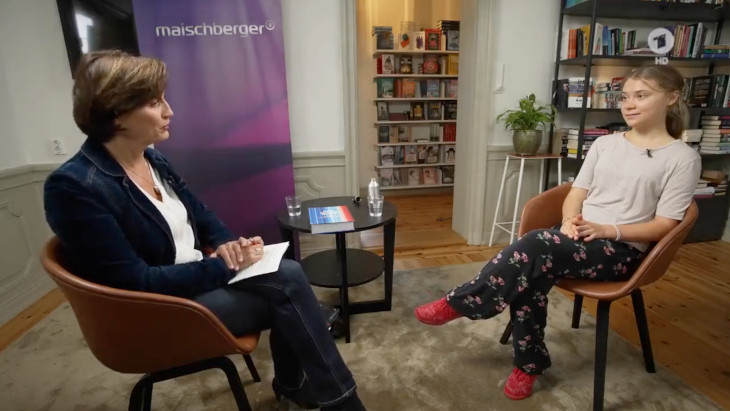In an interview that will be aired as part of the Maischberger talk show on Germany's public service channel ARD 1 on Wednesday, Thunberg was asked about the country's plan to go ahead with closing its nuclear power plants at the end of this year while increasing coal power production in response to gas shortages.
"For the climate issue, are nuclear power plants the better choice for the time being?" asked Maischberger. Thunberg replied: "It depends - If we have them already running, I feel that it is a mistake to close them down in order to focus on coal."
Asked if afterwards they should then by closed down "as fast as possible", Thunberg said: "It depends - we don't know what will happen after all this."
She added, in the interview, that the current crisis showed the need for investment in renewables, to reduce dependence on fossil fuels.
Asked if afterwards they should then by closed down "as fast as possible", Thunberg said: "It depends - we don't know what will happen after all this."
She added, in the interview, that the current crisis showed the need for investment in renewables, to reduce dependence on fossil fuels.
Germany's longstanding Energiewende policy is to close all domestic nuclear power plants and to influence other countries to do the same. However it has been considering delaying the closing of its remaining nuclear power plants given the energy crisis the country faces amid the impact on the gas market of the Russia-Ukraine war.
Thunberg has inspired a large following and at 16 in 2019 became the youngest Time magazine person of the year. In March 2019 a series of Fridays for Future protests numbered 4500 school strikes across 150 countries and involved a total of around 4 million protestors following her example. According to the group 350.org, events in Germany attracted 1.4 million people.
Two days after those events Thunberg made comments on nuclear in a Facebook post, saying that a wide range of solutions applied with guidance from "the best available science" would be needed to create a "global way forward".
The 2019 post continued: "Personally I am against nuclear power, but according to the IPCC, it can be a small part of a very big new carbon free energy solution, especially in countries and areas that lack the possibility of a full scale renewable energy supply - even though its extremely dangerous, expensive and time consuming. But let’s leave that debate until we start looking at the full picture."
In other comments in the new interview, Thunberg sums up her general stance. "I'm realistic. Because if we do the things that we need to do we can avert this catastrophe (of climate change). But if we don't then we will have to suffer the consequences. So it's up to us."
The then German government of Chancellor Angela Merkel decided after the accident at the Fukushima Daiichi plant in Japan in March 2011, that it would phase out its use of nuclear power by the end of 2022 at the latest. Prior to the accident, Germany was obtaining around one-quarter of its electricity from nuclear power.
The country's last three units - Emsland, Isar 2 and Neckarwestheim 2 - are set to close at the end of this year. There have been calls for a rethink, with concerns over gas supplies. The current plan is to keep two of the three on standby to supply power this winter if required.
The then German government of Chancellor Angela Merkel decided after the accident at the Fukushima Daiichi plant in Japan in March 2011, that it would phase out its use of nuclear power by the end of 2022 at the latest. Prior to the accident, Germany was obtaining around one-quarter of its electricity from nuclear power.
The country's last three units - Emsland, Isar 2 and Neckarwestheim 2 - are set to close at the end of this year. There have been calls for a rethink, with concerns over gas supplies. The current plan is to keep two of the three on standby to supply power this winter if required.





_55401.png)
_23009.jpg)

_33392.jpg)






